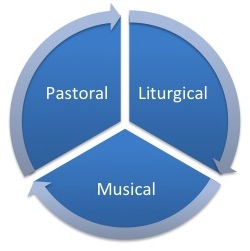
 MONG THE biggest problems liturgical musicians face is the misunderstanding of the role of sacred music in the liturgy. The prism through which many view this role is that of their only frame of reference: the entertainment industry.
MONG THE biggest problems liturgical musicians face is the misunderstanding of the role of sacred music in the liturgy. The prism through which many view this role is that of their only frame of reference: the entertainment industry.
When individuals expect liturgical music to appeal solely to them, can we really blame them? At all? Not really. The world celebrates self and individuality; this is all many know outside of Mass and sadly, within as many parishes adhere to music that attempts to emulate secular models—sometimes poorly. (See The Truth behind Christian Rock: according to Hank Hill.)
When liturgy mirrors secular culture, it is no wonder the church musician is expected in rather demanding fashion to help us pleasantly pass the time. In the commiserative words of Kurt Cobain, “Here we are now, entertain us.” Sometimes, our jobs can feel this way, and sometimes, Mass can feel that way.
But, this is not a rant on sacred music composed in popular styles. Some is quite reverent and well crafted, having found a unique voice in the Church (while an abundance is less artful). The 19th Century was guilty of pandering to the crowds with popular faux-opera, quite ubiquitous in the Victorian era. This alone gave great inspiration to Pope St. Pius X for his 1903 Motu Proprio, Tra le Sollecitudini (“Instruction on Sacred Music”) which in turn inspired Vatican II’s Constitution on the Sacred Liturgy. (1963)
Pope Saint Pius X begins his “instruction” describing the overall purpose of the liturgy as “the glory of God and the sanctification, the edification of the faithful.” But such language sounds so foreign to our modern (and Western) ears. Surely such sentiment is to be dismissed as an irrelevant relic. Or are St. Pius X’s words—which so directly influenced Vatican II—the key to spiritual rebirth?

 O ADVANCE SUCH SPIRITUAL REBIRTH, the job description of a church musician must by necessity be different than what many expect. We differ vastly from entertainers in that we do not point to ourselves or our own achievements. Instead our work must point to God while helping people sing their faith. The 2007 document Sing to the Lord: Music in Divine Worship (SttL) has much to say about entertainment and the role of music in the liturgy:
O ADVANCE SUCH SPIRITUAL REBIRTH, the job description of a church musician must by necessity be different than what many expect. We differ vastly from entertainers in that we do not point to ourselves or our own achievements. Instead our work must point to God while helping people sing their faith. The 2007 document Sing to the Lord: Music in Divine Worship (SttL) has much to say about entertainment and the role of music in the liturgy:
The role of music is to serve the needs of the Liturgy and not to dominate it, seek to entertain, or draw attention to itself or the musicians…The primary role of music in the Liturgy is to help the members of the gathered assembly to join themselves with the action of Christ and to give voice to the gift of faith. (SttL, §125)
 As such, one’s job description or responsibility is three-fold and unified:
As such, one’s job description or responsibility is three-fold and unified:
1 • Musician;
2 • Liturgist;
3 • Pastoral Presence.
One must be highly competent in all three areas. This doesn’t come easily. It might even take a decade or a generation, but be assured, all three are necessary.
Such a trinity of responsibility parallels the section of SttL called, Judging the Qualities of Music for the Liturgy: The Three Judgments: One Evaluation. I have written much about this here.
It is not enough to be a “talented” musician. One must be a competent liturgist, familiar with myriad liturgical documents. If that feels like drinking out of a fire hydrant, it is important to know how to find out what one does not know—what references to use, how to find the liturgical texts, rites, propers, readings, etc. Then it is important to understand the “why” behind the rites and liturgical action. This too may take many years of experience, study, and prayer.
This brings us to the responsibility of pastoral presence. Many musicians leave this part out. A friend is fond of saying, “There are professional musicians who are amateur human beings.” (Not a judgment, just an observation.)
One may be the finest musician in the world, but the willingness and skill to be a pastoral presence will make the difference between failure and success. It requires experience, problem-solving skills, social skills, and creativity to navigate the muddy waters of politics. Your patience will be tested to its limits, sometimes daily.
Who wants to sign up for this? Few, but if God calls us to serve, then dig in! (John 15:16: You did not choose me, but I chose you and appointed you so that you might go and bear fruit—fruit that will last…)
 OW CAN ONE be a pastoral presence? There is no easy formula, but it begins by being grateful to the hard working musicians we have the privilege to pray with. It begins by being grateful for the people in the pews who may not be as musically literate as we are, but are unified with us in the love of Christ. It begins by understanding our role as a servant leader.
OW CAN ONE be a pastoral presence? There is no easy formula, but it begins by being grateful to the hard working musicians we have the privilege to pray with. It begins by being grateful for the people in the pews who may not be as musically literate as we are, but are unified with us in the love of Christ. It begins by understanding our role as a servant leader.
In recognizing our role of service, a positive pastoral presence often goes unseen, recognized, and quite likely unappreciated. (But God sees all.) But it is recognized by its fruit: happy and prayerful musicians emanate a joyful sound of praise. This translates to the hearts of the faithful in their praise of God, in turn strengthening the community.
This can be summarized in another important trinity of ideas: Lex orandi, Lex Credendi, Lex Vivendi —“As we Worship (Pray) So we Believe, So we live.”

Here we are now. Sanctify us.
God is here now. Glorify Him.
Soli Deo gloria
